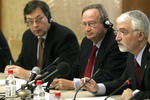- Serbia
Get to know Serbia
- Citizens
Culture and science
Health services
Pension and disability insurance
- Business
Employment
Economy
- Media
- Government
- Contact
Keep in touch
Contact form
Back
Keepin touch
Whether you have a question, comment, suggestion or any problem in the purview of the government, send us your message and we will try to respond as soon as possible. If your problem is not in our purview, we will forward your message to the relevant institution.
Q:
A:
Signing stabilisation agreement is half-way to full EU integration
Belgrade,
15 November 2005
Serbian Deputy Prime Minister Miroljub Labus said today that the Stabilisation and Association Agreement with the EU (SAA) is a cornerstone for Serbia which will signify that our country has passed half-way from the conflicts and isolation to full integration into the EU.
Speaking at a conference entitled "Serbia and negotiations on SAA - coordination and capacity building", Labus said that after concluding this agreement Serbia will have its first contractual relation with the EU.
According to Labus, there are three areas in which Serbia has to make radical changes, and these are politics, the economy and the acceptance of EU standards.
As for the politics, parliamentary democracy was introduced in Serbia, but the system of values which gives meaning to democracy and which is the foundation of the EU has still not been adopted, Labus said.
The Deputy Prime Minister said that Serbia managed to stabilise and liberalise the economy, but structural reforms must be conducted, and this does not only imply the restructuring of public companies.
The purpose of structural reforms is creation of an economy that will be able to stand competition with economies of other EU countries, Labus said and recalled that Serbia adopted many laws which were harmonised with EU standards, but now these laws have to be implemented and institutions for the supervision of that process established.
These changes are necessary regardless of whether we enter the EU or not, the Deputy Prime Minister said and added that the EU is a partner who will help us do that more quickly, in an easier way and with less expenses.
According to Labus, the most important symbolic act in the accession of a country into the EU is the abolishment of visas, but for that to happen Serbia-Montenegro must fulfil a number of conditions, such as the establishment of integrated border management, signing of readmission agreements with all EU members, and a single visa regime between Serbia and Montenegro.
German Ambassador to Serbia-Montenegro Andreas Zobel said that for Serbia the SAA will be a foundation on which other elements leading to EU membership will be added.
Honorary Secretary General of the EU Council Jurgen Trumph voiced hope that Serbia will achieve its final goal and enter the EU, although it lags behind other countries in the region and enters the negotiations later than others.
According to Labus, there are three areas in which Serbia has to make radical changes, and these are politics, the economy and the acceptance of EU standards.
As for the politics, parliamentary democracy was introduced in Serbia, but the system of values which gives meaning to democracy and which is the foundation of the EU has still not been adopted, Labus said.
The Deputy Prime Minister said that Serbia managed to stabilise and liberalise the economy, but structural reforms must be conducted, and this does not only imply the restructuring of public companies.
The purpose of structural reforms is creation of an economy that will be able to stand competition with economies of other EU countries, Labus said and recalled that Serbia adopted many laws which were harmonised with EU standards, but now these laws have to be implemented and institutions for the supervision of that process established.
These changes are necessary regardless of whether we enter the EU or not, the Deputy Prime Minister said and added that the EU is a partner who will help us do that more quickly, in an easier way and with less expenses.
According to Labus, the most important symbolic act in the accession of a country into the EU is the abolishment of visas, but for that to happen Serbia-Montenegro must fulfil a number of conditions, such as the establishment of integrated border management, signing of readmission agreements with all EU members, and a single visa regime between Serbia and Montenegro.
German Ambassador to Serbia-Montenegro Andreas Zobel said that for Serbia the SAA will be a foundation on which other elements leading to EU membership will be added.
Honorary Secretary General of the EU Council Jurgen Trumph voiced hope that Serbia will achieve its final goal and enter the EU, although it lags behind other countries in the region and enters the negotiations later than others.
-
 Belgrade, 21 January 2026
Belgrade, 21 January 2026Key capital market institutions start operating in single building
-
 Belgrade/Davos, 20 January 2026
Belgrade/Davos, 20 January 2026Serbia, Belgrade to be best possible Expo hosts
-
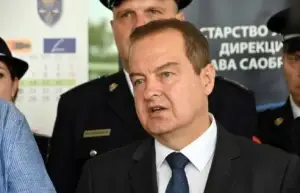 Belgrade, 19 January 2026
Belgrade, 19 January 2026State of emergency lifted in Majdanpek, Mali Zvornik, Lučani, Ivanjica
-
 Belgrade, 10 January 2026
Belgrade, 10 January 2026Just over 22,000 consumers in Serbia currently without electricity
-
 Belgrade, 8 January 2026
Belgrade, 8 January 2026E-Delivery Note, e-Sick Leave systems working well
-
 Belgrade, 31 December 2025
Belgrade, 31 December 2025First Deputy Prime Minister wishes happy New Year to Serbian citizens
-
 Belgrade, 31 December 2025
Belgrade, 31 December 2025Dačić sends New Year greetings to Serbian citizens
-
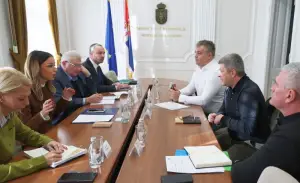 Belgrade, 30 December 2025
Belgrade, 30 December 2025Government committed to creating favourable business environment
-
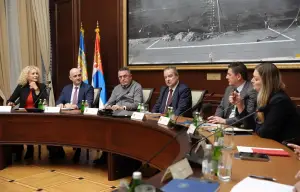 Belgrade, 23 December 2025
Belgrade, 23 December 2025Liaison officers important factor in fight against crime
-
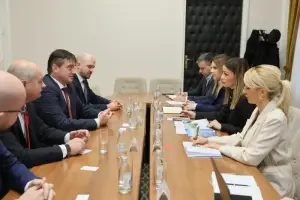 Belgrade, 22 December 2025
Belgrade, 22 December 2025Attracting investments by creating stable business environment


